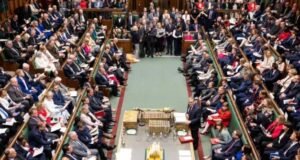Warning comes in government ‘technical notices’ telling businesses and public how to prepare in event of no deal
Consumers would face slower and more costly credit card payments when they buy EU products, and British citizens living abroad could lose access to their bank accounts, in the event of a no-deal Brexit, the government has warned.
The Brexit secretary, Dominic Raab, insisted he was “confident that a good deal is in our sights”, as he launched 24 “technical notices” in Westminster on Thursday morning, telling businesses and the public how to prepare if no deal is reached.
He said the government’s priority was to ensure continuity but the 24 technical notices – the first batch of more than 80 due over the summer – underline the potential impact on daily life, if Britain leaves without a deal in place in March next year.
With UK banks likely to lose access to EU payments systems, the financial services paper warns that, “customers (including business using these providers to process euro payments) could face increased costs and slower processing times for euro transactions”.
It added: “The cost of card payments between the UK and EU will likely increase.”
Customers of UK banks living in the EU “may lose the ability to access lending and deposit services, and insurance contracts”, the paper says.
Meanwhile, businesses are warned that if the UK leaves without a deal, “the free circulation of goods between the UK and EU would cease”.
Firms would need to fill out customs declarations for goods entering the UK from the EU – and should think about whether they should “engage the services of a customs broker, freight forwarder or logistics provider to help, or alternatively secure the appropriate software and authorisations”.
The technical notices also make clear Britain expects the EU to start imposing tariffs on UK goods in the event of no deal.
Businesses should “if necessary, put steps in place to renegotiate commercial terms to reflect any changes in customs and excise procedures, and any tariffs that may apply to UK-EU trade”, the notice on “trading” says.
In a series of other areas, the technical notices strike a more reassuring note, with existing regulations in sectors from workers’ rights to the export of dangerous products due to be transposed into UK law under the EU Withdrawal Act.
With the contentious issue of the Northern Ireland backstop still unresolved between the UK and EU27, businesses trading across the border are advised that they may need to consult the Dublin government.
“The UK would stand ready to engage constructively to meet our commitments and act in the best interests of the people of Northern Ireland, recognising the very significant challenges that the lack of a UK-EU legal agreement would pose in this unique and highly sensitive context. This would include engagement on arrangements for land border trade. We will provide more information in due course,” the technical notice on trading explains.
“If you trade across the land border, you should consider whether you will need advice from the Irish government about preparations you need to make,” it adds.
Raab claimed the withdrawal agreement between the EU and the UK was 80% complete, and pledged to step up the pace of talks with Brussels.
Asked directly about the risks to British citizens living abroad, he said he hoped “cooler heads would prevail”, and allow “practical cooperation” over issues such as access to pensions.
“It’s hardly in the interests of southern Spain to do harm to the British pensioners living out there,” he said.
He said that after the passing of the EU Withdrawal Act, and with 7,000 civil servants already working on Brexit, and funding in place to hire 9,000 more if they were needed, “our laws will be on the statute book, the staff will be in place, and our institutions will be ready for Brexit, deal or no deal”.
The new Brexit secretary, who campaigned vociferously for leave in the 2016 referendum, also sought to play down recent alarming stories about the potential risks of no deal – including the idea that food supplies could be disrupted, or key ingredients no longer available. “You will still be able to enjoy a BLT after Brexit, and there are no plans to deploy the army to ensure food supplies.”
On state aid, the rules currently overseen by the EU that limit taxpayer bailouts, the government said it would create a new “UK-wide subsidy control framework”, which would be overseen by Britain’s Competition and Markets Authority.
Underlining the reach of the EU in all aspects of regulation, the notices also say that Britain would have to introduce new health warnings on cigarette packets, as the copyright for the existing picture library is owned by the European commission.
Don't Miss
- Rizvi rejects move to make July Charter a core principle of constitution
- Khaleda Zia urges govt to ensure advanced treatment for Farida Parveen
- Country’s 95% primary kids exposed to nicotine
- 4 die ‘inhaling toxic gas’ in Moulvibazar tea garden
- July movement’s impact on classes reflected in SSC exam results: Sylhet board chairman
 Weekly Bangla Mirror | Bangla Mirror, Bangladeshi news in UK, bangla mirror news
Weekly Bangla Mirror | Bangla Mirror, Bangladeshi news in UK, bangla mirror news







